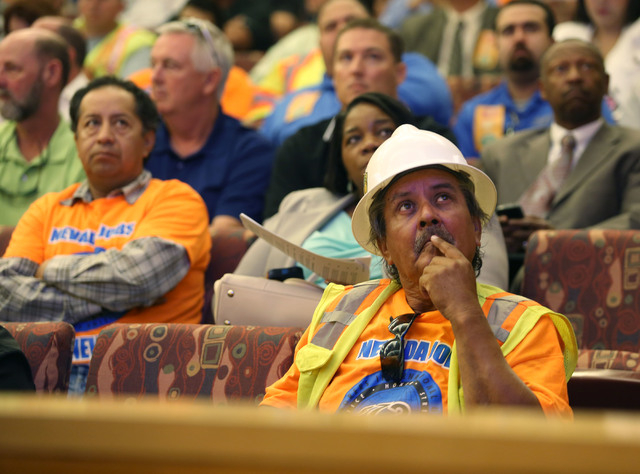Gas tax approved by county

Clark County commissioners voted 6-1 on Tuesday to approve a fuel tax that will add up to 10 cents to each gallon of gas during the next three years.
The fuel tax, which increases based on inflation, will fund road projects in Clark County. The first part of the new fuel tax, pegged at 3.24 cents, kicks in on Jan. 1, 2014. The fuel tax increases are tied to the rate of inflation, but are also capped, which prevents the total additional tax on each gallon from rising above 10 cents a gallon by the end of 2016.
After the January increase, further gasoline tax hikes will come every July between 2014 and 2016.
The fuel tax increases will allow the Regional Transportation Commission to take out bonds for up to $700 million worth of projects. The list of anticipated jobs includes high-profile items like completing the Las Vegas Beltway and getting started on Interstate 11, which would eventually tie Las Vegas to Phoenix.
Commissioners listened to more than an hour of testimony from the public before voting. Supporters contend that the tax increase is needed to bolster the economy and position the county for further growth. Opponents argued against the increase, saying paying more taxes is too burdensome.
In the end, the majority of commissioners sided with the pleas of people like Jimmy McNeece. McNeece, a construction worker, moved to Las Vegas from Long Island, N.Y., in 2005 when times were good. At first, it went well for him with the economy booming. Now, McNeece said he struggles to find enough work.
“Las Vegas needs to get to work,” he said.
McNeece, along with other members of the Laborers Local 872, made a strong show of union support for the proposal at the meeting, saying it’s necessary for economic growth.
Organized labor groups strongly encouraged commissioners to pass the measure. The Nevada AFL-CIO, which represents a variety of unions, had passed a resolution in support of the fuel tax.
“It was the right thing to do,” said Danny Thompson, executive secretary-treasurer of the Nevada AFL-CIO, after commissioners voted. “This will put people back to work.”
But others, like Tasha Heath, disagreed.
“It’s not the government’s job to provide jobs for people,” said Heath, also a founder of Southern Nevada Watchdogs, a local government watchdog organization. “They need to let the free market do it.”
For most commissioners, the decision was about positioning the region for long-term economic growth, and not just with construction jobs. Commissioner Tom Collins brought along a prop: a red, gallon-sized gasoline container with three pennies attached to it to represent the increase.
“We’re recovering here and we need to stay ahead of the curve,” Collins said, adding that the measure will create jobs and improve the highway infrastructure, notably a connection to Phoenix.
Tina Quigley, general manager of the Regional Transportation Commission, told commissioners that the existing fuel tax for consumers hasn’t changed since 1995, resulting in a loss of purchasing power for road construction projects.
Commissioner Larry Brown said that action is needed. Infrastructure projects fall in line with what the public expects of government, he said, adding that the decision will have a lasting impact for years to come.
“We can’t wait,” he said. “We’ve waited for four or five years when everything just about came to a standstill.”
Commission Chairman Steve Sisolak cast the lone vote of dissent.
Sisolak pointed to figures that show Clark County drivers have paid about $800 million in the last five years in fuel taxes and only received back about $300 million. That money that Clark County generates, he said, goes instead to other counties in Nevada. Clark County already has a 9-cent fuel tax in place, while other Nevada counties that have not put a fuel tax in place benefit from Clark County taxpayers, Sisolak said.
“That’s subsidizing other counties that haven’t even implemented their full 9-cent allotment,” Sisolak said.
Without the new fuel tax, each gallon has 52.2 cents of taxes and fees, which includes federal, state and county taxes. Voters in 2016 will decide if the county can impose future fuel tax increases based on inflation. If voters reject it, then the fuel taxes that have already started by the end of 2016 will remain intact.